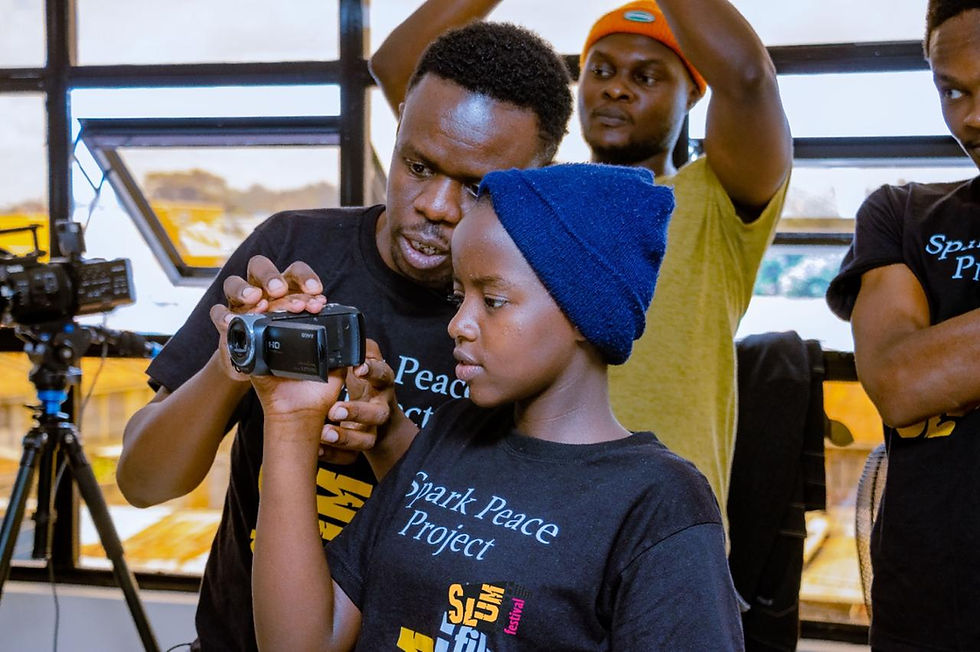FROM THE STREETS TO SCREEN: SLUM FILM FESTIVAL AT CHUKA UNIVERSITY
- Editorial
- May 31, 2025
- 4 min read
By Faith Munanie
When it comes to film, everything starts with a story. If you have a story, that is your first ingredient.

You may have heard of the Slum Film Festival SFF or maybe not. Either way, this is not just another film event. It is a movement rooted in resilience, creativity, and the power of storytelling, especially from communities that are often overlooked.
The Birth of a Vision in Kibera
The Slum Film Festival was founded in 2010 in Kibera, Nairobi’s largest informal settlement. It grew out of a dream by the Kibera Film School, an initiative of the Hot Sun Foundation. Its goal was clear: to empower young people in marginalized communities to tell their own stories through the art of filmmaking.
With limited access to mainstream media and scarce resources, these passionate and newly trained filmmakers decided not to wait for opportunities. Instead, they created their own. That was how the Slum Film Festival began.
“No one was willing to employ or work with the youth from Kibera Film School despite their capabilities—simply because they came from Kibera,” says Josphat Keya, the Director of the Slum Film Festival. “So we thought, why not create our own platform where we can celebrate these young people who are already trained in film.”

Storytelling That Fights Stereotypes
So why did they start? One word: storytelling.
“When the mainstream media reports things that do not actually happen in the slums, it affects the community—especially when they go out there to represent themselves,” says Director Keya.
The youth behind the Slum Film Festival knew their lives were far more complex and meaningful than the stereotypes often portrayed in the media. They wanted to take back the pen and share their own stories of hope, struggle, laughter, dreams, and change.
They were not alone. Organizations like the Coffee Ministry and CFK Africa supported the initiative, recognizing the creative and transformative potential in these young filmmakers. Together, they began building a storytelling revolution.
From Kibera to Chuka: How the Journey Happened
How did the Slum Film Festival make its way to Chuka University? While personal connections helped, the journey was really driven by a shared purpose.
The screening at Chuka was made possible through a partnership between the Slum Film Festival, Geoffrey Kiuna, a recent graduate of the university, and Eric Otieno, a proud alumnus and member of Chuka’s Arts Club. Their collaboration was part of the Spark Peace Project, a community-driven initiative under the Slum Film Festival that focuses on peace building through storytelling.
This particular screening marked the grand finale of a twelve-week hands-on training program in storytelling and filmmaking held in Kibera. The program produced two powerful short films and a compelling photography series under the theme Peace Within My Community. Chuka University was honoured to be among the venues where these creative works were shared and celebrated.

A Glimpse Through Young Eyes
The highlight of the event was the screening of the documentary titled Through Our Eyes. What made this film stand out was not just its message, but the fact that it was delivered by children. Set in the slums, the film explores the concept of peace from a child’s point of view.
“When we talk about peace, we often only listen to adults,” says the director. “But this film gives children a voice. It’s very powerful to hear them speak about things we assume they don’t see or experience. In truth, they have strong opinions.”
For many children in these communities, peace is not defined by the absence of war, but by the presence of basic human dignity. They understand peace in terms of the challenges they witness daily. These include theft and murder, food insecurity, sexual harassment, community sports as a lifeline, police brutality, discrimination, and inequality.
The film asks a bold question: What if peace was not just a hope, but a lived experience? The documentary is raw, emotional, and unforgettable.
A Movement in Motion
The work of the Slum Film Festival goes beyond one film. Over the years, the team has produced a wide range of films on themes such as youth engagement, the Constitution, politics, climate change, and peace building. Each film offers a window into lives and realities that are rarely seen on the big screen. These are stories told by the people who live them.

What Makes the Slum Film Festival Unique
The Slum Film Festival is more than just a festival. It is a platform, a school, and a community. It is dedicated to amplifying underrepresented voices through training, mentorship, and artistic collaboration.
The festival equips young filmmakers from slums and underserved areas with the tools they need to tell their stories authentically. It proves that creativity does not require privilege. It only needs passion, purpose, and opportunity.
“Every screening is not just an event. It is a celebration of rising voices, changing perspectives, and futures being rewritten through film,” says Keya.
A Call to Storytellers
“To anyone out there with a story burning inside them, especially those from the margins, this is your moment,” Keya encourages. “You do not need a fancy camera or a million shillings. You can always tell your story.”
The Slum Film Festival is a shining example of what happens when young people dare to dream, speak, and create even when the world does not expect it of them.
Perhaps now you are interested in filmmaking too. If you are passionate about storytelling, filmmaking, or supporting grassroots creativity, reach out to the Slum Film Festival. You can find them on all social media platforms under the name Slum Film Festival.
“Sanaa ni kioo cha jamii. Sisi ndio wasanii.”
Art is the mirror of society. We are the artists.




Comments